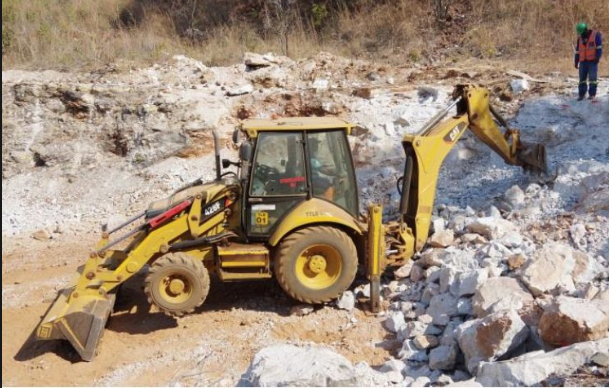By Shame Makoshori
Australian Stock Exchange listed lithium miner, Prospect Resources this week increased reserve estimates by 58,7 percent at its multimillion dollar Zimbabwe based asset, Arcadia, after fresh exploration revealed major discoveries.

Prospect Resources chairman, Hugh Warner said a new exploration programme had revealed further increases in the ore reserve to 26,9 metric tonnes (Mt), after a pre-feasibility study announced on July 3, 2017 had declared estimated ore reserve at 15,8 Mt.
In a statement to shareholders yesterday, the miner said its ambitions to build one of Africa’s largest lithium operations, expected to last 20 years, had been bolstered by positive signals from the incoming new President Emmerson Mnangagwa’s administration that is working on reforms to improve investor relations.
“These are exciting times for Zimbabwe and for Prospect,” said Warner.
“During the past 10 days we have seen a peaceful transition of leadership in Zimbabwe and we have all read the positive remarks that the new President has made with respect to welcoming foreign investment.
Harry Greaves (Executive Director) and I believe that Prospect is well placed to participate and contribute to the rejuvenation of Zimbabwe.
This is another great result for our shareholders. Part of the reason for such a massive increase in our ore reserve is the effectiveness and detail of our exploration programme,” he said.
He spoke as other miners had also signaled prospects for robust growth in Zimbabwe in the aftermath of ex-president, Robert Mugabe’s exit mid last month.
The last decade of Mugabe’s 37 year rule had been hard for the mining industry.
There were threats of forced takeovers under difficult laws enacted specifically to make it difficult for foreign investors who were seen then as the forces behind what Harare saw as attempts to topple the man seen across Africa as a liberator, but viewed as one of the worst dictators in the West.
But Mnangagwa’s new regime has promised to open up the country to investment including mines, sparking a flurry of hope for the industry.
Last week, researchers at the London-based Equities Development Limited (ED) said the exit of Zimbabwe’s longtime ruler heralded a positive turn for the country’s mining industry,
ED, which tracks counters quoted on the London Stock Exchange’s Alternative Investments Markets (AIM), has noted that the high risk factors associated with the ex-president’s regime would most likely improve.
In its brief dispatch to clients, the advisory firm gave an investment case for the AIM-quoted Vast Resources, which controls 25 percent shareholding in the Zimbabwe-based Pickstone-Peerless gold mine and 100 percent shareholding in Manaila polymetallic mine in Romania. Zimbabwe’s mining sector underpins the country’s economic performance.
Industry data indicates that export dollars from the mining sector accounted for half of total receipts generated by the country in the past nine years, with 145 000 workers directly and indirectly benefiting from the resources sector.
The mining industry has been riding on aggressive expansion at the country’s three platinum mines, which reorganised after being ravaged by hyperinflation in 2008.
The mines brushed aside the threats of expropriation and harsh taxes to build the base on which government says could generate US$2,6 billion in mineral exports this year. Total export revenue has been averaging about US$2 billion in the past five years.
But the industry has failed to reach its full potential due to a plethora of problems, among them a power supply crisis during much of Mugabe’s 37-year long grip on power; a punitive tax regime; and investor fatigue caused by unfriendly laws imposed on investors by the ex-leader who relinquished power three weeks ago following days of a standoff with the military.
The Chamber of Mines of Zimbabwe says the country’s 800 mines have capacity to earn US$18 billion per annum.
This represents about a tenth of the sector’s full potential and translates to a loss of potential revenue amounting to US$16 billion annually, or US$144 billion in eight years.
However, ED’s analysis of the post Mugabe economic and political climate indicating that there was a silver lining on the mining industry.
“We view the end of the Mugabe regime as positive for the mining sector, as it will help to shrug off the heavy risk discount attached to Zimbabwe assets,” it said in its commentary. The Financial Gazette






